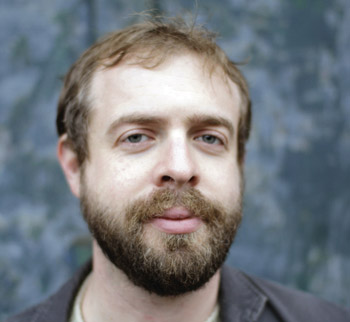Being the youngest Governor General’s Literary Award winner for poetry is an impressive feat in and of itself. But having written the award-winning poetry collection shortly after suffering a mental breakdown and being diagnosed with a rare disorder is that much more impressive.
Jacob Scheier was 28 when he published More to Keep Us Warm in 2008, a collection that explores themes including love, loss and religion and was inspired by the death of his late mother Libby Scheier, a Toronto poet, who died in 2000.
Just three years before getting the literary award, Scheier found himself in a psych ward struggling with a rare psychiatric disorder called hallucinogen persisting perception disorder, or HPPD – a condition that nearly caused him to kill himself. It was the start of an ongoing journey that he chronicled in his latest project, a Toronto Star ebook titled My Never-Ending Acid Trip: Why I still hallucinate years after taking LSD.
“When I was a teenager I did a lot of hallucinogenic drugs, especially a lot of LSD… it was a recreational thing,” he said in an interview with The CJN.
In his ebook, he wrote about his eight-hour trips, how the acid “made my thoughts more interesting, reality more layered and colourful… As interesting an experience as it is, eight hours is about all people can handle. This is because there is one thought people tend to have on acid that can send them spiralling into a bad trip: what if I never come down? Everyone has heard the urban legend about the kid who never stopped tripping. I’m that kid.”
Scheier explained that in 2005, he was diagnosed with clinical depression, and as a result he also suffered from anxiety, for which he was given a small dose of an antipsychotic medication along with his antidepressant.
He said within a few days of taking his medical cocktail, “I began to have hallucinatory experiences quite reminiscent of being on LSD…”
He began to see green lines, facial distortions, trails and afterimages.
“Clinically speaking, I have been on a ceaseless visual acid flashback for eight years, brought on (according to several psychiatrists) by hallucinogen use in combination with little-known side effects from one or more commonly prescribed psychiatric medications,” he wrote.
Scheier said that his condition, HPPD, is very rare, “and in my case, it was a rarity within a rarity because I did all that LSD and I stopped when I was 18 or 19, and I didn’t have flashbacks, or have any visual oddities… Fast forward eight years later and I take this medication and it triggers it.”
He said he managed to reduce the severity of the symptoms with one of the drugs he was prescribed for his anxiety, but it didn’t completely alleviate the symptoms.
“I would sort of be tripping, you could say… I was having very severe and constant visual disturbances… As the [ebook] chronicles, I had a total mental breakdown. I was in a psych ward, it was a total nightmare,” he said adding that at his lowest point, he nearly killed himself.
“I didn’t know what was wrong with me for a long time, it took a long time to get that diagnosis. I thought I was schizophrenic or something. It took me about a year of acceptance and then a year of getting back to normal life.”
Although HPPD appears to be a chronic illness, Scheier said the symptoms have alleviated over time.
“But I still have mild visual disturbances. I still see trails when objects pass me… all the time. I’m acclimatized to it,” he said.
“I don’t think too much about it. But when I decided to write about it, I started to notice the visual disturbances all the time again, because it set off an attention mechanism and so it’s like, the more you think about it, the more you see it.”
He says based on his experiences and own research, he describes himself as being quite critical of psychiatry.
“I think the profession that people usually turn to, to help them is not as informed as they present themselves to be about what may be going on in the brain… and they are equally as unsure about how the medications they prescribe work and they don’t know what to do when they don’t work in the way they’re supposed to,” Scheier said.
“I think [psychiatry is] founded on the best of intentions but I don’t think it’s very honest with people about its limitations… People should be informed about what they’re taking and why.”
He said psychiatrists present drugs for mental illnesses “as though SSRIs [selective serotonin re-uptake inhibitors] were the equivalent of insulin for diabetes and that is just false. That is a mythology and they shouldn’t propagate that mythology. They should say, ‘This drug might make you feel better. I don’t really know how it works, I don’t really know what’s going on in your brain, but you might want to take this.’”
Scheier added that as someone who does still take psychotropic medication to treat his symptoms, he also goes to therapy and exercises, in an attempt to find an alternative treatment to drugs.
“I wouldn’t tell anyone that they shouldn’t be on medication. I definitely think people should be given the correct information… and people should do what works for them.”
He said he hopes his ebook, which is available for download for $2.99 at stardispatches.com/starstore, will stimulate discussion about medication.
“It brings up important questions and I hope people will read it.”
